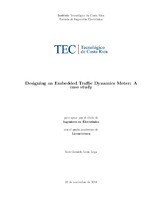Designing an Embedded Tra c Dynamics Meter: A case study
Resumen
Costa Rica is actually facing a severe problem with people transportation caused by
tra c congestions, which degrade people life quality due to the time invested during daily
commutation, and the stress during the driving. One of the reasons is the incapability of
automatic tra c signals to respond to the change in tra c dynamics during the day.
In order to reduce the impact of automatic signalling on tra c congestions, this work
proposes to quantify tra c dynamics using average speed, tra c
ow, tra c density,
and sensor occupancy using Computer Vision. However, there are constraints such as
Internet connection unavailability to upload data to the Cloud, and absence of enough
energy to power a high-performance computer up in some places. Therefore, the challenge
of developing this meter implies to implement the system on a low-power platform.
The application is optimised using Approximate Computing paradigm to tackle this problem,
after noticing that it is possible to enhance runtime and power consumption sacri
cing results accuracy. After applying approximations, it is possible to improve the
application runtime up to 2:55x introducing an error of 11:5% on output results. En la actualidad, Costa Rica enfrenta un problema severo en el transporte de personas
que causa congestiones en el tr´afico vehicular y que degrada la calidad de vida de su
poblaci´on debido al tiempo que se invierte durante su traslado de un lugar a otro y el
estr´es durante la conducci´on. Una de las razones de este problema es la se˜nalizaci´on vial
autom´atica, que no responde a la fluctuaci´on de la din´amica del tr´afico en el tiempo.
Para reducir el impacto del problema asociado con la se˜nalizaci´on autom´atica sobre el
congestionamiento vial, esta investigaci´on propone cuantificar la din´amica del tr´afico vehicular midiendo la velocidad promedio, el flujo vehicular, la densidad y el tiempo de
ocupaci´on promedio de un veh´ıculo bajo el sensor, usando visi´on por computador. Sin
embargo, existen algunas limitantes para llevar a cabo esta tarea, como el acceso a una
conexi´on a Internet estable para subir datos a la nube, la ausencia de suficiente energ´ıa en
lugares aislados para alimentar equipos de alto rendimiento, que son necesarios para ejecutar algoritmos complejos de an´alisis de im´agenes. Por lo tanto, el reto de este proyecto
implica implementar una aplicaci´on de software en un sistema de bajo consumo, pero que
sea capaz de ejecutar todos los algoritmos complejos para la medici´on del tr´afico vehicular.
Para afrontar el problema, la aplicaci´on es optimizada mediante el paradigma de la Computaci´on Aproximada, aprovechando la naturaleza inexacta de los algoritmos utilizados
en el proyecto y la posibilidad de mejorar el tiempo de ejecuci´on y el consumo de energ´ıa
sacrificando precisi´on en los resultados. Despu´es de aplicar aproximaciones, ha sido posible mejorar la aplicaci´on reduciendo en hasta 2.55 veces el tiempo de ejecuci´on al mismo
tiempo en que se introdujo un error de hasta 11.5% en los resultados de la cuantificaci´on
de la din´amica del tr´afico vehicular.
Descripción
Proyecto de Graduación (Licenciatura en Ingeniería Electrónica) Instituto Tecnológico de Costa Rica, Escuela de Ingeniería Electrónica, 2018.


